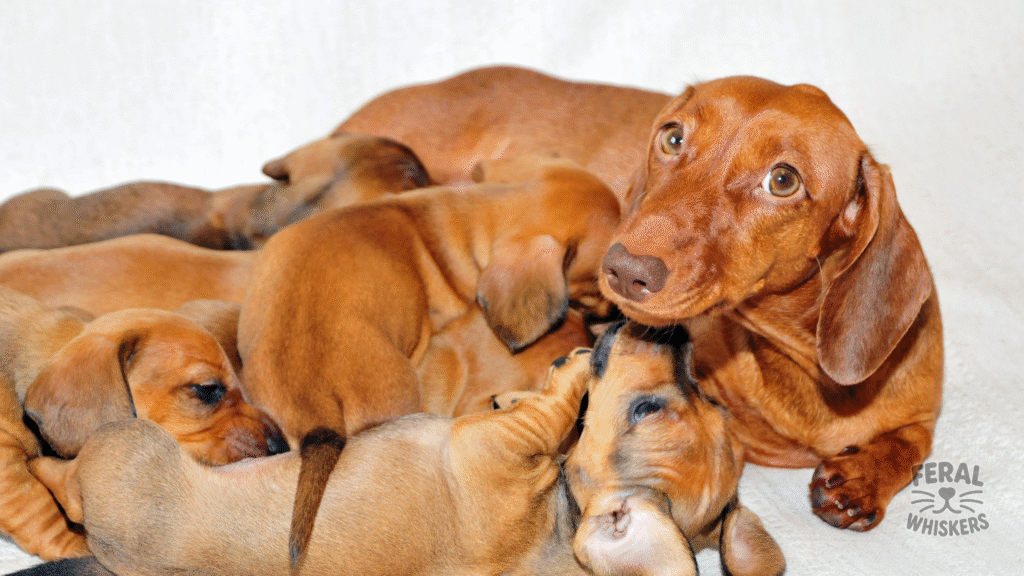Why Canine Herpesvirus Matters

Canine Herpesvirus (CHV-1) is a highly contagious viral infection that is often mild or asymptomatic in adult dogs but can be devastatingly fatal for newborn puppies, causing what is known as “Fading Puppy Syndrome.”
While not a direct threat to human health (it’s not zoonotic), CHV-1 is a significant concern for breeders, shelters, and anyone involved in puppy care, as it can lead to entire litters being lost. Understanding its transmission, symptoms, and prevention is crucial for protecting vulnerable puppies.
How Canine Herpesvirus Spreads
CHV-1 is primarily transmitted through direct contact with infected bodily fluids.
- Direct Contact: The most common route. This includes contact with nasal secretions, vaginal discharge, or saliva from an infected dog.
- Sexual Contact: Infected dogs can transmit the virus during mating.
- From Mother to Puppy (Vertical Transmission):
- In Utero: Puppies can be infected before birth if the mother is infected during pregnancy.
- During Birth: Puppies can contract the virus as they pass through an infected birth canal.
- Post-Natal: Puppies can be infected through contact with an infected mother’s oral or nasal secretions, or through milk (though less common).
- Contaminated Environment: While less common than direct contact, the virus can survive for a short time on surfaces, bedding, or shared bowls, potentially infecting other dogs.
Symptoms of Canine Herpesvirus
The symptoms of CHV-1 vary dramatically depending on the dog’s age and immune status.
In Newborn Puppies (Most Severe – “Fading Puppy Syndrome”):
- Sudden Death: Often, puppies die suddenly without any prior symptoms, usually within the first 3 weeks of life.
- Weakness & Lethargy: Puppies become listless, stop nursing, and are unresponsive.
- Crying & Whining: Persistent, high-pitched crying.
- Abdominal Pain: Puppies may show signs of discomfort, such as hunching or crying when touched.
- Soft, Yellow-Green Stools: Diarrhea is common.
- Lack of Coordination: Tremors or difficulty moving.
- Hypothermia: Inability to maintain body temperature, leading to coldness.
- Nasal Discharge: Clear or bloody discharge.
- Petechiae: Small, pinpoint hemorrhages on the gums or abdomen.
⚠️ Mortality Rate: Nearly 100% in puppies infected in the first few weeks of life.
In Adult Dogs (Often Mild or Asymptomatic):
- Respiratory Signs: Mild cough, nasal discharge, or sneezing (often mistaken for kennel cough).
- Reproductive Issues (in breeding dogs):
- Females: Vaginal inflammation (vaginitis), stillbirths, abortions, or reabsorption of fetuses.
- Males: Inflammation of the testicles (orchitis) or epididymis (epididymitis).
- Eye Inflammation: Conjunctivitis (pink eye) or corneal ulcers.
- Skin Lesions: Small, fluid-filled blisters (vesicles) on the genitals or inner thighs (rare).
When to See a Vet 🩺
For Puppies:
- Immediate veterinary attention is required if any newborn puppy shows signs of weakness, stops nursing, cries excessively, or dies suddenly. Time is critical.
For Adult Dogs:
- If a breeding female experiences stillbirths, abortions, or repeated unsuccessful pregnancies.
- If a breeding male shows swelling or pain in the testicles.
- If any dog develops respiratory symptoms, eye inflammation, or genital lesions after contact with other dogs, especially in a breeding environment.
Diagnosis
Diagnosing CHV-1 can be challenging, especially in adult dogs with mild symptoms.
- For Puppies:
- Post-mortem examination: The most definitive diagnosis is often made by examining deceased puppies, looking for characteristic lesions (hemorrhages in organs).
- PCR testing: Tissue samples from deceased puppies or swabs from live puppies can be tested for viral DNA.
- For Adult Dogs:
- PCR testing: Swabs from nasal, vaginal, or preputial (penile) secretions.
- Serology: Blood tests to detect antibodies to CHV-1, indicating past exposure. However, antibodies don’t always mean active infection or immunity.
Veterinary Treatment
There is no specific antiviral treatment for CHV-1 in dogs. Treatment is primarily supportive.
For Puppies:
- Supportive Care:
- Warmth: Maintaining body temperature is crucial, as the virus thrives in cooler temperatures. Incubators or warming pads are used.
- Fluids: Subcutaneous or intravenous fluids to combat dehydration.
- Antibiotics: To prevent secondary bacterial infections.
- Antivirals (experimental): Some human antiviral drugs have been tried, but their efficacy in puppies is unproven.
- Prognosis: Unfortunately, the prognosis for infected newborn puppies is very poor, with a high mortality rate.
For Adult Dogs:
- Symptomatic Treatment:
- Antibiotics: For secondary bacterial infections (e.g., in respiratory cases).
- Anti-inflammatory drugs: To manage pain or swelling.
- Eye medications: For conjunctivitis or corneal ulcers.
- Management in Breeding Programs: Infected adults should be identified and managed to prevent further spread to litters.
Vaccination 💉
❌ No commercially available vaccine for CHV-1 exists in the U.S. or many other countries.
- Some European countries (e.g., France, Germany) have a vaccine (e.g., Eurican Herpes 205) for pregnant bitches to protect puppies, but it’s not widely available globally.
- Prevention relies heavily on management and hygiene.
Holistic Support & Prevention 🌿
While holistic methods cannot cure CHV-1, they are vital for boosting overall immunity, supporting recovery from secondary infections, and strengthening the health of breeding dogs to minimize viral impact.
🥣 Immune-Boosting Diet for Breeding Dogs & Puppies
A strong immune system is the first line of defense.
- For Breeding Females:
- High-Quality Protein: Lean meats (chicken, turkey, beef, fish) for muscle and immune cell production.
- Antioxidant-Rich Foods: Blueberries, spinach, kale, carrots to combat oxidative stress.
- Omega-3 Fatty Acids: Fish oil, sardines for anti-inflammatory support.
- Probiotics: Fermented foods (kefir, plain yogurt) or supplements to support gut health, which is crucial for immunity.
- For Puppies (if they survive initial infection):
- Easily Digestible, Nutrient-Dense: Small, frequent meals of cooked lean meats, pumpkin, sweet potato.
- Hydration: Bone broth for electrolytes and gut healing.
👉 Breeding Female Immune Support Meal:
- 1 cup cooked lean ground turkey
- ½ cup cooked sweet potato mash
- ¼ cup steamed spinach
- 1 tbsp plain, unsweetened kefir
- 1 tsp fish oil
Serve daily as part of a balanced diet, especially during breeding and pregnancy.
🌿 Herbal & Natural Remedies
These can support the immune system and reduce inflammation.
- L-Lysine: An amino acid that may help inhibit herpesvirus replication (consult vet for dosage).
- Echinacea & Astragalus: Immune-modulating herbs (use under holistic vet guidance, especially during pregnancy).
- Medicinal Mushrooms (Reishi, Turkey Tail): Known for immune-boosting and antiviral properties.
- Colostrum: Rich in antibodies and growth factors, can be given to puppies (if available) to boost passive immunity.
- Vitamin C & E: Antioxidants to support immune function and cellular health.
🌿 Natural Prevention Strategies
Since there’s no vaccine, strict management is key.
- Isolation of Pregnant Bitches: Keep pregnant females away from other dogs (especially new dogs or those with unknown health status) for the last 3 weeks of pregnancy and the first 3 weeks after birth.
- Strict Hygiene: Disinfect whelping boxes, bedding, and feeding equipment regularly.
- Temperature Control: Maintain a warm environment (85-90°F for the first week) for newborn puppies, as the virus replicates poorly at higher temperatures.
- Testing: Test breeding dogs for CHV-1 antibodies to identify carriers.
- Avoid Stress: Stress can trigger viral shedding in carriers.
- Limit Visitors: Reduce exposure to outside germs during the critical puppy period.
Long-Term Outlook
- For Puppies: Extremely poor prognosis if infected in the first few weeks. Survivors may have long-term neurological issues or organ damage.
- For Adult Dogs: Generally good prognosis. Most adults recover fully from mild symptoms and become carriers, potentially shedding the virus intermittently. They can continue to breed, but careful management is needed to protect future litters.
Facts
- Temperature Sensitivity: CHV-1 replicates best at cooler temperatures (around 90°F/32°C), which is why newborn puppies (who can’t regulate their body temperature well) are so vulnerable. Adult dogs, with higher body temperatures, are more resistant.
- “Fading Puppy Syndrome”: CHV-1 is a leading cause of this devastating condition, where seemingly healthy puppies rapidly decline and die.
- Species-Specific: CHV-1 only affects canids (dogs, wolves, coyotes). It cannot be transmitted to humans or other animal species.
- Lifelong Carrier: Once infected, a dog remains a lifelong carrier of the virus, even if asymptomatic. Stress or immunosuppression can trigger viral shedding.
Common Questions
Can my dog get CHV-1 from a human?
No, CHV-1 is species-specific to canids.
If my adult dog has CHV-1, will they always be sick?
No, most adult dogs are asymptomatic carriers. They may shed the virus periodically, especially during stress.
Can I breed a dog that has tested positive for CHV-1?
Yes, but with extreme caution. Strict isolation protocols for pregnant females and meticulous hygiene are essential to protect puppies.
Is there a cure for CHV-1?
No, there is no cure. Treatment is supportive, and prevention is key.
Final Takeaway
Canine Herpesvirus (CHV-1) is a silent but deadly threat to newborn puppies, causing “Fading Puppy Syndrome” with a near 100% mortality rate. While adult dogs often show mild or no symptoms, they can be lifelong carriers and transmit the virus.
Since no vaccine is widely available, prevention relies on strict hygiene, isolation of pregnant females, maintaining warmth for puppies, and robust immune support through diet and holistic remedies for breeding dogs.
Understanding CHV-1 is paramount for breeders and pet owners to protect the most vulnerable members of our canine families.

